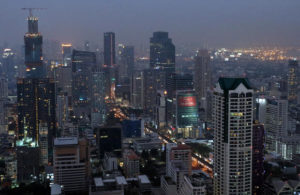
China’s largest developer readies to enter Thailand
Country Garden prepares new overseas brand as Beijing scrutinizes investments
In a modern office block in Huay Kwang district, the team settling down to a routine Monday morning is employed by the new Thailand branch of Country Garden Holdings, China’s largest property developer by contracted sales in the first half of 2017.
This is the Chinese company’s latest foray in Southeast Asia, and a string of projects are planned for the Thai capital next year.
“In addition to Bangkok, Country Garden is also scouting for sites in Pattaya and Phuket,” said a veteran of the Thai property market. Both seaside resorts attract millions of foreign visitors each year.
The developer is expected to launch a new brand overseas soon, replacing Country Garden with a rejuvenated and more international vibe.
“Many people in Thailand are not aware of Country Garden,” said one property executive. “And those in the know associate it with a suburban Chinese developer of mediocre properties.”
Bangkok continues to see a property boom that some fear may be turning into a bubble. The most dynamic features are condominiums near mass transit systems, and residential developments in outlying areas of Greater Bangkok.
One of the leading Thai developers, Sansiri, has been keen to attract foreign buyers. It hopes they will spend 10 billion baht ($304.4 million) this year — a figure has been adjusted up from 7.5 billion baht earlier in the year. The Thai-listed company racked up 5.7 billion baht in foreign sales in 2016, an increase of 55% year on year.
Market watchers are not surprised by Country Garden’s interest in the Thai property boom. Buyers from China, Hong Kong, Japan, Malaysia, Singapore, and Taiwan continue to be attracted by good value offerings. About 37% of Sansiri’s foreign demand last year came from Hong Kong, and 31% from China, according to its president, Srettha Thavisin. The government caps foreign ownership in individual condominiums at 49%.
“Country Garden’s [initial] projects in Thailand should be smaller scale so that it doesn’t invite Chinese government scrutiny,” said Alan Jin, an analyst with Mizuho Securities Asia in Hong Kong. Beijing, he notes, is keeping an eye out for projects that require major funding and borrowing. This has reined in overseas expansion of the property sector. “But it doesn’t mean that they have to kill all the projects abroad,” he said.
According to a document released in August by China’s State Council, regulators sat on a string of foreign acquisitions out of concern that the companies involved were taking on too much debt. The document limits overseas investments in hotels, cinemas, the entertainment industry, real estate, and sports clubs. It also bans outright investments in enterprises related to gambling and the sex industry.
Those already on the government’s radar include sprawling conglomerates such as Wanda Group, Anbang Insurance, Fosun International, and HNA Group that have expanded rapidly through debt-fueled foreign acquisitions. Among the purchases: New York’s famed Waldorf Astoria Hotel.
It therefore came as little surprise when Jeff Lin, Country Garden’s chief strategy officer, told Bloomberg in September that the company is “hitting the pause button on international expansion,” and delaying some investments. Country Garden had been looking at six cities in India but has put matters on hold for the time being.
Headquartered in Foshan in Guangdong Province, Country Garden is best known internationally for Forest City, a $100 billion investment in the southern Malaysian state of Johor Bahru. The project is being built on four artificial islands near Singapore covering 2,000 hectares. Country Garden announced on June 20 it would proceed with the second stage of Forest City, investing $280 million in golf courses, an international school, and another hotel.
Chief Financial Officer Wu Bijun in late August insisted that the State Council’s new policy would not impact Forest City, but said the company was widening its sales effort. “We have broadened our reach to global buyers from 23 countries,” she said. “Our path will only be smoother.”
Country Garden, which will join Hong Kong’s benchmark Hang Seng Index on Dec. 4, has an impressive top-line spreadsheet. Last year, it more than doubled contracted sales to 308.8 billion yuan ($46.6 billion), making it the third-largest developer in revenue after giants China Evergrande and China Vanke. In the first nine months of 2017, Country Garden’s contracted sales reached 428.2 billion yuan, ahead of Vanke’s 396.1 billion yuan and Evergrande’s 378 billion yuan.
Deutsche Bank expects Country Garden to achieve 530 billion yuan of contracted sales this year, growing 72% year on year. “We believe its high growth is sustainable, as the current land bank can sustain flattish sales in 2018 even without further land banking,” it said in a note in August. “This has taken into consideration of its strong execution to launch projects for presale in less than seven months post land acquisitions.”
Source: https://asia.nikkei.com/Business/Companies/Chinese-developer-resumes-Asian-expansion-in-Thailand


